Mutations in mitochondrial enzyme GPT2 cause metabolic dysfunction and neurological disease with developmental and progressive features
Author(s)
Ouyang, Qing; Nakayama, Tojo; Baytas, Ozan; Yang, Chendong; Schmidt, Michael; Lizarraga, Sofia B.; Mishra, Sasmita; EI-Quessny, Malak; Niaz, Saima; Gul Butt, Mirrat; Imran Murtaza, Syed; Javed, Afzal; Chaudhry, Haroon Rashid; Vaughan, Dylan J.; Hill, R. Sean; Partlow, Jennifer N.; Yoo, Seung-Yun; Lam, Anh-Thu N.; Nasir, Ramzi; Al-Saffar, Muna; Barkovich, A. James; Schwede, Matthew; Nagpal, Shailender; Rajab, Anna; DeBerardinis, Ralph J.; Mochida, Ganeshwaran H.; Morrow, Eric M.; Davidson, Shawn M; Housman, David E; ... Show more Show less
DownloadOuyang-2016-Mutations in mitocho.pdf (1.679Mb)
PUBLISHER_POLICY
Publisher Policy
Article is made available in accordance with the publisher's policy and may be subject to US copyright law. Please refer to the publisher's site for terms of use.
Terms of use
Metadata
Show full item recordAbstract
Mutations that cause neurological phenotypes are highly informative with regard to mechanisms governing human brain function and disease. We report autosomal recessive mutations in the enzyme glutamate pyruvate transaminase 2 (GPT2) in large kindreds initially ascertained for intellectual and developmental disability (IDD). GPT2 [also known as alanine transaminase 2 (ALT2)] is one of two related transaminases that catalyze the reversible addition of an amino group from glutamate to pyruvate, yielding alanine and α-ketoglutarate. In addition to IDD, all affected individuals show postnatal microcephaly and ∼80% of those followed over time show progressive motor symptoms, a spastic paraplegia. Homozygous nonsense p.Arg404* and missense p.Pro272Leu mutations are shown biochemically to be loss of function. The GPT2 gene demonstrates increasing expression in brain in the early postnatal period, and GPT2 protein localizes to mitochondria. Akin to the human phenotype, Gpt2-null mice exhibit reduced brain growth. Through metabolomics and direct isotope tracing experiments, we find a number of metabolic abnormalities associated with loss of Gpt2. These include defects in amino acid metabolism such as low alanine levels and elevated essential amino acids. Also, we find defects in anaplerosis, the metabolic process involved in replenishing TCA cycle intermediates. Finally, mutant brains demonstrate misregulated metabolites in pathways implicated in neuroprotective mechanisms previously associated with neurodegenerative disorders. Overall, our data reveal an important role for the GPT2 enzyme in mitochondrial metabolism with relevance to developmental as well as potentially to neurodegenerative mechanisms.
Date issued
2016-09Department
Massachusetts Institute of Technology. Department of BiologyJournal
Proceedings of the National Academy of Sciences
Publisher
National Academy of Sciences (U.S.)
Citation
Ouyang, Qing; Nakayama, Tojo; Baytas, Ozan; Davidson, Shawn M.; Yang, Chendong; Schmidt, Michael; Lizarraga, Sofia B. et al. “Mutations in Mitochondrial Enzyme GPT2 Cause Metabolic Dysfunction and Neurological Disease with Developmental and Progressive Features.” Proceedings of the National Academy of Sciences 113, no. 38 (September 2016): E5598–E5607. © 2016 National Academy of Sciences
Version: Final published version
ISSN
0027-8424
1091-6490